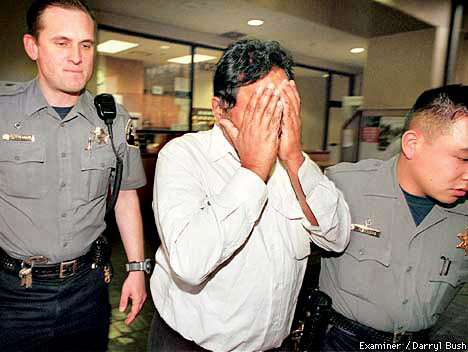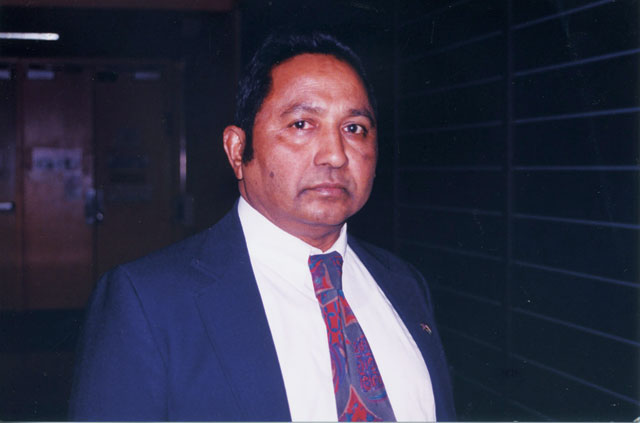Advocates for increased prison terms say 10-year-old sex trafficking case changed conversation
This special report appeared in the Spring 2012 print edition of the San Francisco Public Press. (Read in Spanish at La Opiñon/Impremedia. Leer en español en La Opiñon/Impremedia.)
More than a decade after she was freed from a sex trafficking ring in Berkeley, one survivor still has nightmares about Lakireddy Balireddy.
“Sometimes I wake up in the middle of the night after I dream that he is lying next to me, or see someone taking me to him,” said the young woman, now in her late 20s, who agreed to an interview on the condition of anonymity. “I jump out of bed and turn on all the lights to make sure he’s not in the room.”
The media circus that resulted as the sex trafficking case broke in early 2000, with daily outraged headlines about Lakireddy’s “sex slaves,” started a statewide conversation that led directly to the passage in 2005 of Assembly Bill 22, California’s first law setting higher criminal penalties for human trafficking.
This year’s campaign to get tougher anti-trafficking laws on the November ballot as a voter initiative is the latest attempt to deal with what proponents call the unfinished business of legal reform.
Former Assemblywoman Sally Lieber, the chief sponsor of the 2005 state law, said the Lakireddy case “was confirmation of what the problem was,” and “was definitely on our minds” when she and colleagues in the Legislature drafted the law. The final version established human trafficking for forced labor or services as a felony, punishable by a sentence of 3, 4 or 5 years (depending on severity of the case) in state prison for trafficking of an adult, and a sentence of 4, 6 or 8 years for trafficking of a minor.
The law also provides for monetary restitution and allows trafficking victims to bring civil actions against traffickers.
It might seem like a potent tool, but Lieber said tougher laws are needed.
The new initiative, a reform that proponents are calling the Californians Against Sexual Exploitation Act, would extend prison terms and allow fines of up to $1.5 million for human traffickers. It would also require training for law enforcement, something that could have helped police detect the sex trafficking ring much sooner, said San Francisco attorney Michael Rubin of the law firm Altshuler Berzon LLP, who represented some of Lakireddy’s victims in a 2002 civil suit.
An accidental death
In 2001, federal law enforcement officials convicted the then 64-year-old restaurateur and real estate tycoon — one of Berkeley’s richest landlords, who raked in at least $1 million a month from his 1,000 or more rental properties — of two counts of transportation of minors for illegal sexual activity. He was also convicted of conspiracy to commit immigration fraud and filing a false tax return.
A federal investigation also found that Lakireddy had been “carrying out a widespread conspiracy since 1986 to bring at least 25 Indian laborers into the United States through false pretences,” according to a March 2001 Department of Justice statement. The immigrants were brought from his native village of Velvadam in southern India.
The sexual abuse of the girls began years earlier in the village and continued after he trafficked them into the United States, prosecutors said.
“He turned Berkeley into a Velvadam-by-the-Bay,” Rubin said.
In addition to subjecting the trafficked girls to what federal prosecutors called “sexual servitude,” Lakireddy allegedly forced many of them to work in his downtown Berkeley Indian restaurant, and do cleaning and maintenance work on his rental properties. He justified not putting them on payroll, or paying them very little, by saying he provided them free food and accommodation. Few of the girls were sent to school.
The abuse might have gone undetected even longer but for a carbon monoxide leak in November 1999 in one of his Berkeley apartments that killed Chanti Pratipatti, 17, whom he had trafficked months earlier. She and her 15-year-old sister had been brought to the country by two of Lakireddy’s relatives who masqueraded as their parents, and were siblings themselves.
Lakireddy was arrested on Jan. 14, 2000, two days before his planned departure to his native land with one of his trafficked victims.
A March 7, 2001, Department of Justice press release said Lakireddy might face up to 38 years in prison under a plea deal he struck with prosecutors. But that April, before he could be sentenced, his attorneys managed to bargain it down to a 97-month term. Lakireddy also agreed to pay $2 million in restitution to the surviving sister, her parents and an 18-year-old girl who was living with the sisters at the time of the accident.
Lakireddy spent a little less than eight years in Lompoc federal prison. After his release in 2008, he registered as a California sex offender.
Asked why the real estate tycoon received so much lighter a punishment than originally threatened, the two main prosecutors declined to comment. The presiding judge did not return several phone calls seeking comment.
‘Creative’ ways to sue
Anti-trafficking activists said the legal reforms that later made prosecutions easier coincided with growing public awareness about the problem of human trafficking — transporting people for labor through force, fraud or coercion.
“Until 2000, nobody knew what human trafficking was, what the term meant,” said Cupertino-based Kavitha Sreeharsha, executive director of Global Freedom Center, a recently launched nonprofit organization that fights trafficking worldwide.
Sreeharsha, who has been at the forefront of women’s rights for nearly 20 years as a lawyer and activist, said the case of the notorious Berkeley landlord was a game changer. It “galvanized” victim assistance providers in the Bay Area and ultimately served as “the building block for the state’s anti-trafficking movement.”
But when Rubin filed the civil lawsuit against Lakireddy, he did not have the benefit of the state’s anti-trafficking laws. Nor could he apply any of the provisions of the federal Trafficking Victims Protection Act, the nation’s first anti-trafficking law enacted in 2000.
“When we filed the civil suit, federal law did not yet provide civil action for victims of sex and labor trafficking,” Rubin said.
The federal act strengthened criminal sanctions for forced labor, mandated that victims receive social and legal support and gave victims the right to remain in the United States if they cooperated with law enforcement. But that was only for federal cases. California prosecutors would wait another five years for the state’s own anti-trafficking law.
Rubin had to base his case on other laws. He said he thought the victims had not received justice in the criminal case, and that they should be compensated for the harm done to them.
“We had to pursue our lawsuit in a very creative way,” Rubin said. “We had to develop new theories because there were no applicable anti-trafficking statutes back then.”
The civil complaint, filed in Alameda County Superior Court in Oakland, accused Lakireddy of “slave labor,” “false imprisonment,” and “infliction of emotional distress,” among other claims. The allegations of the civil complaint also accused Lakireddy of having raped the women he trafficked.
The complaint also included claims brought under the federal Racketeer Influenced and Corrupt Organization, or RICO, statute. Filed on behalf of nine alleged victims of the Lakireddy clan, the lawsuit sought up to $100 million in damages.
In the complaint, Rubin accused the defendants of exploiting the victims’ “youth, their fear, their caste status, their poverty, their unfamiliarity with the American legal system, their inability to speak English, and their immigration status” for the defendants’ “personal pleasure” and “illicit profit.”
The class-action lawsuit resulted in an $8.9 million settlement in June 2004.
Lakireddy Balireddy did not act alone to mistreat the women he brought to America. He had help from several members of his family, prosecutors discovered.
Five members of Lakireddy’s family were also implicated by law enforcement in various aspects of his criminal activities. His sons, Vijay Kumar Lakireddy and Prasad Lakireddy, were indicted in 2001 on several counts of rape and conspiring with their father for more than a decade to smuggle women and girls into the U.S. to have sex with them, the San Francisco Chronicle reported. In an agreement with prosecutors, the most serious charges were dropped and Vijay Kumar Lakireddy pleaded guilty to immigration fraud conspiracy. He was sentenced to two years in prison and agreed to undergo drug treatment and pay $40,000 in fines. Lakireddy Balireddy’s brother and sister-in-law were also convicted of related crimes.
Beyond the criminal case, Rubin’s civil suit also brought in several other relatives as defendants.
Influence in Indian village
The Lakireddy trafficking saga revealed elements of feudalism and casteism that clashed with American cultural and social norms. Those factors made it complicated to address what prosecutors and lawyers in the U.S. saw as a broader trafficking operation.
In Velvadam, an agrarian village of about 8,000 in the southern Indian state of Andhra Pradesh, Lakireddy’s immense wealth — his Berkeley properties alone are worth an estimated $60 million — and his long ties to America earned him both respect and fear.
Western journalists who descended on the village soon after his arrest were surprised by the extent of his power among locals. Minutes after reporters entered the village, banners went up on buildings. One read: “Lakireddy Is Our God. Leave Him Alone.” Another declared: “Lakireddy Is Innocent.”
Lakireddy used his inherited and earned wealth to launch several philanthropic ventures. Starting in the mid-1980s, he built two elementary schools and a high school in Velvadam. The state-of-the-art Lakireddy Balireddy College of Engineering, opened in 1998, lent a certain cachet to the neighboring township of Mylavaram. He also created new sources of clean drinking water. Bus shelters sport the Lakireddy name.
Many of the girls he was accused of exploiting belonged to the so-called untouchable communities, their parents barely making $1 a day from menial jobs. Most lived in one-room thatched-roof houses.
Prosecutors said during his criminal case in U.S. District Court in Oakland Lakireddy convinced villagers that an American lifestyle was within their grasp if they just gave him their young daughters. Many obliged, including the parents of the two sisters who had lived in the Berkeley apartment where the fatal gas leak occurred.
The girls’ older sister had already been married off when the two younger sisters went to live with Lakireddy. “We couldn’t have afforded the kind of dowry we paid for our older daughter,” explained their mother, Lakshmi Pratipatti, in an interview in Velvadam in 2000. She said she and her husband felt that sending two of the daughters off to the United States with Lakireddy would save them a fortune.
The two sisters, like nearly all the other girls, had ostensibly been recruited to work as servants in his opulent three-story home in Velvadam that sat on a beautifully landscaped two-acre plot. Behind those walls, they also worked as his sex slaves, Rubin’s civil lawsuit alleged, something that some trafficked victims said their parents must have known would happen.
Victims still uneasy
“I was given to him when I was nine,” one trafficked woman said, adding: “The day I was given to him, my childhood ended and my misery began.”
Lakireddy “was unimaginably wealthy, all-powerful and in apparent full control of the world in which they were brought to live,” prosecuting Assistant U.S. Attorney John Kennedy said in court papers during the criminal proceedings.
The Lakireddy case may have led to California’s first anti-trafficking law, but reform advocates say its longer-term aftermath is less heartening. Victims and lawyers say the Lakireddy case continues to haunt its victims.
Even as the momentum grows to combat trafficking in the state, the survivors have been unable to find peace of mind. More than a decade after she was rescued, one young woman still needs to take sleeping pills to help her cope with flashbacks.
Meanwhile, Lakireddy Balireddy, now 75, roams freely in his village, which he visits twice a year, and continues to enjoy the admiration of many of those around him, according to his brother, Lakireddy Hanimireddy, a cardiologist who lives in Merced.
“He has the 100 percent respect of the people of Velvadam,” the brother said. “His overwhelming good deeds and not his bad deeds are what earn him so much respect.”











